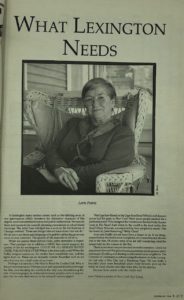WHAT LEXINGTON NEEDS, by Loris Points
photo by M. Watt
February 1994 Ace

While we pursue these serious tasks, some recreation is important. That prompts me to address a NEED that would improve the qualify of life for moviegoers. COULD WE ALL REMAIN SEATED UNTIL THE MOVIE IS OVER? When is the film really over? When the Dolby insignia comes on, the credits have completely run, and the lights turn on. There are no dramatic curtain flourishes such as we once had and for which some of us yearn.
Perhaps it is time for a We Want to Read the Credits Club. Why is this an important issue? Perhaps a jazz lyric appeared midway through the film, and checking the credits is the only way of confirming the title. Cinematography is of interest to many people — who is responsible for the very dark movie or the unusual camera angles?
Was Cape Fear filmed on the Cape Fear River? Which well-known actors had bit parts in Short Cuts? Were stunt people needed for a particular scene? Who designed the voluminous dresses Holly Hunter wore in The Piano? And where in the world is the mud really that deep? Many films are accompanied by fine symphonic music. Was the music by John Browning? Philip Glass?
American Graffiti should have been a lesson to us. If we disappeared before the credits were completed, we missed the end, the real end of the film. Of course some of us are still wondering what the future held for the women in the film.
There is one more concern it would be well to mention. Could we plant more flowers? Neighborhood associations could sponsor plant exchanges. Dividing and sharing could connect us as neighbors. The Chamber of Commerce could encourage businesses to make Lexington not only a Tree City, but a Blooming Place. We can make a beautiful place more beautiful — plant more flowers, pick up the trash, be vocal citizens, and take some time for the movies.
See you there, seated, until the credits end.
Loris Points is a teacher at Tates Creek High School.
Ace February 1994, page 5





